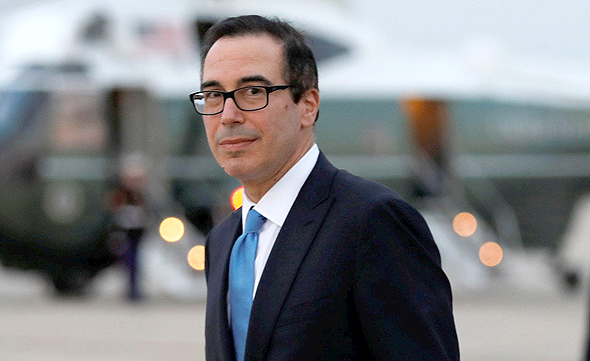Steven Mnuchin, Israeli Counterpart Moshe Kahlon Discuss Updates to U.S.-Israel Tax Treaty
The bilateral agreement between Israel and the U.S. drafted in 1975 is seen as outdated and unreflective of current market realities
A U.S. delegation headed by Secretary of Treasury Steven Mnuchin is meeting today with Israeli Minister of Finance Moshe Kahlon and his team, and with Israeli Prime Minister Benjamin Netanyahu. On the agenda, according to two people who spoke with Calcalist on condition of anonymity, is updates to the current tax treaty between the two countries.
For daily updates, subscribe to our newsletter by clicking here.
The American delegation includes U.S. Ambassador to Israel David M. Friedman, Deputy Secretary of the U.S. Department of Housing and Urban Development Pamela Hughes, the Under Secretary of the Treasury for Terrorism and Financial Intelligence Sigal Mandelker, and Assistant Secretary of State for Economic and Business Affairs Manisha Singh. On the Israeli side the meeting will be led by Shai Babad, director general of the finance ministry.

The bilateral agreement between Israel and the U.S. was first drafted in 1975, coming into effect in 1995. As it was drafted when Israel was still a developing country, the treaty is seen as outdated and does not reflect currently widely applied taxation models, especially for handling foreign investments.
The Israeli tax on foreign direct investments (FDI) is 25% on dividends for sole investors and 12.5% for companies. These rates are perceived as less competitive today for a developed country, and unreflective of the types of cross-border investments being made between the U.S. and Israel. Following recent tax reforms that lowered corporate tax in both the U.S. and Israel the scheme is even more so seen as impeding investments in Israel.
Another clause on the list is the exemption from capital gains tax. Foreign investors are only taxed in their country of residence, meaning Israeli residents investing in the U.S. only pay capital gains tax in Israel, and vice versa. While that is the case for all other tax treaties Israel has signed, the agreement between Israel and the U.S has an exception: an investor that holds a stake of over 10% will have to pay capital gains tax in both his country of residence and the country of origin. Finance ministry executives who spoke with Calcalist on condition of anonymity state the clause puts a ceiling on FDI.
While drafting and creating a new treaty will be a lengthy process, the expectation is that the meetings will result in the establishment of a team to head the process, something Israel has been pushing for several years.



